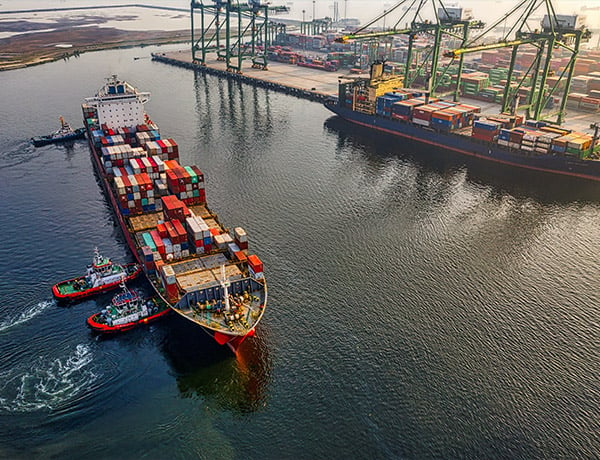Ocean Freight Company: Your Trusted Partner in Global Shipping Solutions

In the vast and interconnected world of international trade, ocean freight companies stand as key players, facilitating the movement of goods across oceans and continents. As businesses expand their reach beyond borders, the need for efficient and reliable shipping solutions becomes paramount. Ocean freight company play a pivotal role in providing comprehensive logistics services that cater to the diverse needs of businesses worldwide. In this comprehensive guide, we will delve into the world of ocean freight companies, understanding their functions, services, and the value they bring to the dynamic landscape of global trade.
1. The Role of Ocean Freight Companies
At the heart of international trade, ocean freight companies act as intermediaries between businesses and the global shipping network. Their primary role is to organize and manage the transportation of goods via sea routes, ensuring timely deliveries, efficient cargo handling, and seamless logistics solutions.
Ocean freight companies collaborate with shipping lines, freight forwarders, and various stakeholders to orchestrate the entire shipping process. From booking cargo space on vessels to managing customs procedures, warehousing, and distribution, these companies streamline the complex supply chain, helping businesses navigate the challenges of global trade.
2. Services Offered by Ocean Freight Companies
Ocean freight companies offer a wide array of services tailored to meet the diverse needs of businesses engaged in international trade. Some of the key services include:
a) Full Container Load (FCL) and Less than Container Load (LCL) Shipments
Ocean freight companies manage both FCL and LCL shipments, catering to businesses with varying cargo volumes. FCL shipments allow businesses to book entire containers for exclusive use, while LCL shipments consolidate smaller shipments into shared containers, optimizing cost efficiency.
b) Cargo Booking and Scheduling
Ocean freight companies liaise with shipping lines to secure cargo space on vessels that align with businesses’ shipping requirements. They manage the booking process and ensure timely scheduling of shipments.
c) Customs Clearance and Documentation
Navigating the complex realm of customs procedures and documentation is a crucial aspect of international shipping. Ocean freight companies handle the necessary paperwork, ensuring compliance with customs regulations and facilitating smooth cargo clearance.
d) Cargo Tracking and Visibility
With advanced technology and tracking systems, ocean freight companies provide real-time visibility of cargo throughout the shipping journey. Businesses can monitor their shipments, gaining valuable insights into the status and location of their goods.
e) Warehousing and Distribution
Upon arrival at the destination port, ocean freight companies can provide warehousing and distribution services, facilitating the onward transportation of goods to their final destination.
f) Freight Insurance
To safeguard against potential risks during transit, ocean freight companies offer freight insurance options, providing peace of mind for businesses in case of unforeseen circumstances.
g) Supply Chain Optimization
Ocean freight companies analyze and optimize supply chain processes, helping businesses streamline their operations, reduce costs, and enhance overall efficiency.
3. Choosing the Right Ocean Freight Company
Selecting the right ocean freight company is a critical decision that can significantly impact a business’s shipping operations and success in international trade. Consider the following factors when choosing an ocean freight partner:
a) Experience and Expertise
Look for an ocean freight company with extensive experience in the industry and a proven track record of successful shipping operations. A company with specialized expertise in handling specific types of cargo or navigating specific trade lanes can be particularly valuable.
b) Global Network and Coverage
An ocean freight company with a robust global network and coverage ensures access to a wide range of shipping routes and destinations. This global presence enables businesses to reach new markets and expand their global footprint.
c) Technology and Visibility
Advanced technology and tracking systems are vital for real-time visibility and updates on cargo movements. Choose a company that offers comprehensive technological solutions for enhanced cargo tracking and transparency.
d) Customer Service and Support
Reliable customer service and support are crucial for a smooth shipping experience. Look for an ocean freight company that provides responsive and accessible customer service, addressing any queries or concerns promptly.
e) Financial Stability
An ocean freight company’s financial stability is an important consideration, as it reflects its ability to handle large-scale shipping operations and contingencies effectively.
4. Value Proposition of Ocean Freight Companies
a) Cost-Effectiveness
Ocean freight remains one of the most cost-effective modes of transporting goods over long distances, making it a preferred choice for businesses with large cargo volumes.
b) Reliability and Predictability
Ocean freight companies adhere to established shipping schedules, ensuring reliable and predictable transit times for businesses.
c) Sustainability and Environmental Responsibility
Advancements in vessel technology and fuel efficiency contribute to the environmental sustainability of ocean freight, aligning with businesses’ efforts to embrace greener logistics solutions.
d) Global Connectivity
Ocean freight companies provide businesses with access to a vast network of shipping routes and ports, enabling seamless connectivity to international markets.
e) Customized Solutions
Ocean freight companies offer customized shipping solutions tailored to meet the unique requirements of businesses, ensuring optimal efficiency and cost savings.
5. Challenges and Future Trends
a) Capacity and Equipment Availability
Fluctuations in cargo demand can impact vessel capacity and equipment availability, leading to challenges in securing cargo space during peak seasons.
b) Port Congestion and Delays
Port congestion and delays at busy terminals can affect transit times and supply chain efficiency.
c) Digitalization and Blockchain
The future of ocean freight lies in digitalization and blockchain technology, which promise increased transparency, efficiency, and security in shipping operations.
d) Sustainability and Emission Reduction
As environmental concerns grow, the industry is focusing on reducing emissions and embracing sustainable practices to minimize the environmental impact of ocean freight.
6. Conclusion
Ocean freight companies are indispensable partners in the complex and interconnected world of global trade. With their comprehensive services, global networks, and commitment to efficiency, these companies play a vital role in facilitating seamless international shipping for businesses across industries. As businesses continue to explore new markets and expand their horizons, ocean freight forwarding services will remain key enablers, supporting the growth and success of global commerce.




